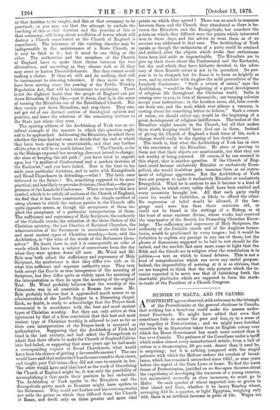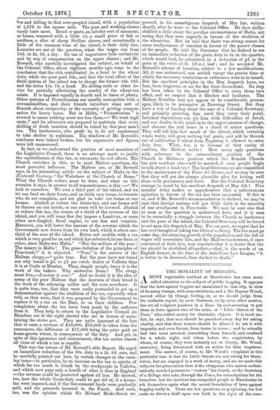HUNGER IN MALTA, AND ITS CAUSES.
AFORTNIGHT ago we observed, with reference to the triumph of the Protectionists at the general elections in Canada, that nothing but a bread-tax could make the masses under- stand Free-trade. We might have added that even that sometimes fails to arouse the poor and hurvry to a sense of the impolicy of Protectionism ; and we might have fortified ourselves by an illustration taken from an English colony over which the Home Government has much more control than it has over Canada. The patience of the Canadians under a tariff which makes almost every manufactured article, from a ball of cotton to a steam-engine, 30 per cent. dearer than it need be, is surprising; but it is nothing compared with the stupid patience with which the Maltese endure the cruelest of bread- taxes, which has remained untouched since 1837, or nine years before the repeal of the Corn Laws at home. To find the worst forms of Protectionism, justified on no fine-spun theories about the expediency of developing the resources of a young country, but maintained avowedly as class measures, we must go to Malta. On each quarter of wheat imported into or grown in that island and Gozo, whether it be heavy Bombay wheat, averaging 510 lb. a quarter, or light Egyptian, weighing only 462, there is an artificial increase in price of 10s. Wages are low and falling in that over-peopled island, with a population of 1,376 to the square mile. The poor and working-classes rarely taste meat. Bread or paste, an inferior sort of macaroni, or beans, seasoned with a little oil, a small piece of fish or sardines, a slice of cheap Sicilian cheese, and occasionally a little of the common wine of the island, is their daily fare. Luxuries are out of the question, when the wages run from 10d. to 2s. 6d. a day. No tax of importance falls exclusively and by way of compensation on the upper classes ; and Mr. Rowsell, who carefully investigated the subject, on behalf of the Colonial Office, about eighteen months ago, came to the conclusion that the rich contributed 5s. a head to the wheat duty, while the poor paid 108., and that the total effect of the fiscal system of the island was to charge the former 10s. 10d. and the latter 15s. 7d. a head. No sliding scale or other de- vice for partially alleviating the cruelty of the wheat-tax exists. It is imposed equally in dearth and in times of plenty. Other systems of Protectionism are usually monopolies with a circumbendibus, and their friends introduce some sort of flourish about reciprocity, or the necessity of getting compen- sation for heavy taxes. But in Malta, " Protectionism " is avowed to mean nothing more nor less than,—" We want high rents ;" and its advocates are prepared to maintain that every shilling of fresh taxation should be raised by this poor man's tax. The landowners, who profit by it, do not condescend to take shelter in sophisms. The windows of Mr. Rowsell's residence were indeed broken, but his arguments and figures were left unanswered.
In fact, as we understand the position of most members of the Legislative Council, there is no attempt made to justify the equitableness of this tax, or extenuate its evil effects. The Church exercises in this, as in most Maltese questions, the most powerful influence. The Maltese are, as Mr. Rowsell says, in his interesting article on the subject of Malta in the Ninteentli Century, "the Wahabees of the Church of Rome." What the Church orders, must be done, and what on this occasion it says, in answer to all remonstrances, is this :—" We look to ourselves. We own a third part of the island, and we let our land on short leases, and on fairly easy terms, to tenants who do not complain, and are glad to take our farms or our houses. Abolish or reduce the Grain-tax, and our farms will be thrown on our hands, or our rents will be lowered. Abolish or reduce this tax, the source of a third of the revenue of the island, and you will some fine day impose a Land-tax, or some other new-fangled, fiscal engine, to our loss and vexation. Moreover, you will lower the amount of the revenue which the Government now draws from its own land, which is about one- third of the area of the island. Better not meddle with a tax which is very good for us, and which has subsisted,in one form or other, since Malta was Malta." "But the welfare of the poor ! The misery in Malta ! The gross violation of the principles of Free-trade !" it is objected. "True," is the answer of the Maltese clergy,—" quite true. But the poor have not found out why bread is id. to Id. per roto/o dearer at Valletta than it is at Corfu or Messina. They, simple people, fancy it is the work of the bakers. Why undeceive them? The clergy must live,—Lasciate is cose!" And no doubt it is the idea of many of the poor Maltese that the dearness of their bread is the work of the scheming miller and the corn merchant. It is quite true, too, that they were easily persuaded to get up a demonstration against the abolition of the tax, especially when told, as they were, that it was proposed by the Government to replace it by a tax on the Mass, or on their children. Few complaints about the tax have been made by the sufferers from it. They help to return to the Legislative Council six Members out of the eight elected who are in favour of main- taining the status quo. They are quite ignorant of the fact that to raise a revenue of £48,000, £65,000 is taken from the consumers, the difference of £17,000 being the price paid on home-grown wheat, in consequence of the duty. And yet, in spite of this ignorance and contentment, this tax unites almost all vices of which a tax is capable. This was the tenour of Mr. Rowsell's able Report. He urged an immediate reduction of the 10s. duty to a 2s. 6d. rate, and he carefully pointed out how, by certain changes in the exist- ing taxes—in particular, by an increase on the tax in spirits, of which far too much is drunk by the workpeople in Valletta, and which now pays only a fourth of what it does in England —the revenue could be protected against all loss. He showed, too, how the whole, Grain-duty could be got rid of, if a house- tax were imposed, and if the Government lands were gradually sold, and the proceeds invested in the Funds. And such, too, was the opinion which Sir Michael Hicks-Beach ex- make so direct a draft upon our faith in the right of the corn- pressed, in his unambiguous despatch of May last, written shortly after he went to the Colonial Office. He then shilly- shallied a little about the peculiar circumstances of Malta, not seeing that they were urgently in favour of the abolition of the wheat-tax. But he said that there was strong reason for some readjustment of taxation in favour of the poorer classes of the people. He told the Governor that he desired to see an immediate reduction of the grain duty to 5s. in the quarter, which would lead, he calculated, to a reduction of id. in the price of the rotolo (1 lb. 12 oz.) loaf ; and he accepted Mr. Rowsell's scheme of taxation, subject to a few modifications. All, it was understood, was settled except the precise time at which the necessary resolutions or ordinances were to be issued. But the excellent principles in the May despatch have, we fear, been forgotten, or are for the time discredited. No step has been taken by the Colonial Office to carry them into effect, and we suspect that it flinches and hesitates. The Maltese Notables may not appear to be considerable person- ages, likely to be persuasive at Downing Street. But they have a way of buzzing about the ears of a Colonial Secretary, and patiently pestering him until they carry their point. Informal deputations can ply him with difficulties of detail, and sow doubts in his mind as to the opportuneness of change, and obscure the real issues in a cloud of minor questions. They will tell him that much of the island, which certainly wants water, will grow nothing but grain, and will be thrown out of cultivation if wheat from Taganrog is allowed to enter duty free. What, too, is to become of that vanity of vanities, the Maltese noble ? How many ugly questions with reference to the extraordinary position of the Church in Malta—a position which the Romish Church has now nowhere else—will be mooted, if once people begin to talk about a land-tax ? The local Government are committed to the maintenace of the Tassa del Grano, and we may be sure that they will put the always plausible plea for letting well alone with persistency and force. Has the Colonial Secretary courage to stand by his excellent despatch of May 4th Five months' delay makes us apprehensive that a subterranean agitation in favour of the tax has been successful. If this is so, and if Mr. Rowsell's recommendation is shelved, we may be sure that foreign nations will put little faith in the sincerity of our attachment to Free-trade. We may be sure also that as soon as the question is understood here, and it is seen to be essentially a struggle between the Church as landowner and the poor of the island, the Colonial Secretary will be forced to act upon his despatch of May. For our part, we regret that he has ever thought of taking two bites at a cherry. The tax must go some day, the alarming growth of the population and the fall of wages will necessitate this, and the Maltese landowners, if once convinced of their fate, may conclude that it is better that the tax should be abolished altogether,—that, in the words of an English farmer, in the time of the Anti-Corn Law League, "it is better to be drowned, than ducked to death."



































 Previous page
Previous page